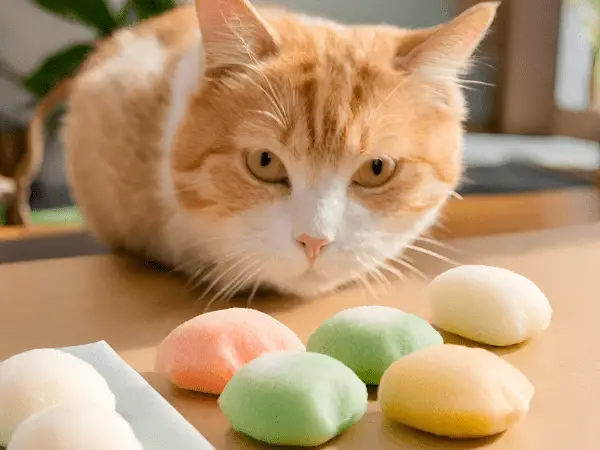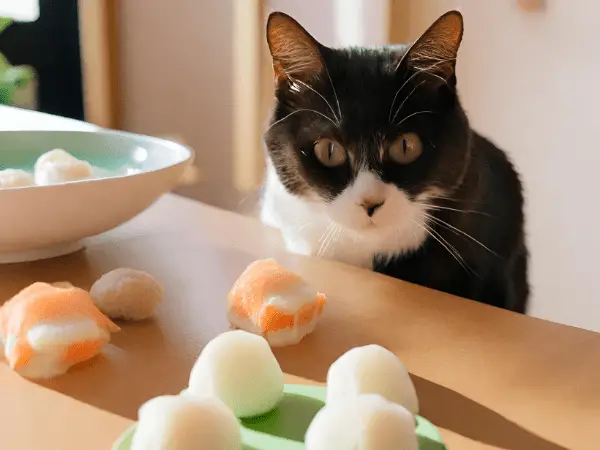Cats should not eat mochi due to choking risks and possible ingredient toxicity. Mochi’s sticky texture can pose a health hazard to felines.
Mochi, a Japanese rice cake, poses significant risks for cats. This chewy treat, while enjoyed by humans, is not suitable for our feline friends. The texture of mochi is particularly dangerous, as it can lead to choking or blockages in a cat’s digestive tract, a serious issue often overlooked by pet owners.
Additionally, mochi may contain ingredients like sugar, milk, or flavorings that are not cat-friendly. Responsible pet ownership involves understanding the dietary needs and restrictions of our pets. While it’s tempting to share our favorite snacks with our furry companions, it’s crucial to recognize that what’s harmless to us may not be safe for them. Always opt for treats designed specifically for cats to ensure their well-being.
The Popularity Of Mochi
Mochi has taken the world by storm, becoming a beloved treat for many. This Japanese rice cake wins hearts with its chewy texture and sweet taste. It’s versatile too, showing up in a variety of shapes and flavors. Mochi in Cat Owners‘ Homes
Mochi In Cat Owners’ Homes
In addition to enticing human palates, mochi has made a home in the homes of cat owners. Curiosity sparks as they wonder: Can cats safely enjoy mochi?
Trend Of Offering Mochi To Cats
With mochi’s popularity, some cat owners are tempted to share this treat with their pets. This trend calls for a closer look into mochi’s suitability for a cat’s diet.
Nutritional Value Of Mochi
Mochi itself is made from glutinous rice, which brings up concerns regarding its nutritional value for cats. An assessment is necessary to ensure a safe and healthy diet for our feline friends.
| Nutrient | Presence in Mochi | Relevance for Cats |
|---|---|---|
| Carbohydrates | High | Minimal nutritional need |
| Proteins | Low | Essential in higher amounts |
| Fats | Low to None | Needed in moderation |
Understanding Cats’ Dietary Needs
Understanding Cats’ Dietary Needs is essential for any cat owner. Cats are obligate carnivores, which means they require certain nutrients that can only be found in animal products. Their bodies are designed to process meat-proteins efficiently, and this natural dietary requirement defines what is safe for them to consume.

Importance Of Balanced Diet For Cats
Cats need a mixture of protein, fats, and a small amount of carbohydrates to thrive. A balanced diet ensures they receive all the vital vitamins and minerals. The right diet supports their energy levels, maintains a healthy coat, and supports immune system function.
- High-quality animal protein for muscle maintenance
- Fats for energy and a shiny coat
- Carbohydrates in minimal amounts for digestive health
- Vitamins and minerals for overall well-being
Potential Risks Of Feeding Mochi To Cats
Mochi is a sweet Japanese rice cake which can pose risks to your cat’s health. Its sugar content and chewy texture can lead to:
- Digestive upset
- Obesity from excess calories
- Dental problems from sugary content
- Potential choking hazard due to its sticky nature
Consult with a vet before introducing new foods into your cat’s diet to ensure their health and safety.
Risks And Dangers
When considering sharing mochi with your feline friend, it is paramount to be aware of the risks and dangers. Cats’ bodies are vastly different from humans’. As such, foods safe for us might not be for them. Below, explore why mochi might not be the best treat for your cat.
Choking Hazard
The sticky, chewy texture of mochi can pose a significant choking hazard to cats. Their smaller throats can easily become blocked if they fail to chew the mochi thoroughly. Chunks of mochi can quickly become lodged in the airway, leading to a life-threatening situation.
Digestive Issues
Mochi contains ingredients that cats usually don’t digest well. The primary component, glutinous rice, is high in carbohydrates. Cats, obligate carnivores, lack the necessary enzymes to break down such a large amount of carbs efficiently. This can lead to:
- Stomach upset: Nausea, vomiting, and discomfort.
- Diarrhea: Loose stools can cause dehydration.
- Weight gain: Excess carbs can contribute to obesity.
- Allergic reactions: Some ingredients could trigger allergies.
We could include a table if there were specific nutritional values to compare, but in this case the points are already well-summarized in the list format.

Safe Alternatives
Cats love a good treat. Yet, not all treats are safe. Mochi, for example, is not the best choice for your feline friend. Safe alternatives are available to satisfy their cravings without compromising their health. Exploring cat-friendly treats and healthy snack options ensures your pet stays happy and healthy.
Cat-friendly Treats
The right treats can be a fun way to reward your kitty. Below are some safe and delicious options:
- Cooked meat: Small pieces of chicken or turkey.
- Commercial cat treats: Choose those with no added salt or sugar.
- Freeze-dried meats: Convenient and irresistible for cats.
- Catnip or cat grass: For a natural, plant-based treat.
Healthy Snack Options
Focusing on health is essential. Here are some healthy snack ideas:
- Pureed pumpkin: Good for digestion.
- Baked carrots: Soft enough to chew, and full of nutrients.
- Apple slices: Make sure to remove the seeds.
- Cooked eggs: Packed with protein, but only in moderation.
Recognizing Mochi Poisoning
If you’re a cat owner, it’s crucial to know which treats are safe for your furry friend and which are not. Mochi, a popular Japanese rice cake, may seem harmless, but can it pose a risk to your pet? In the section ‘Recognizing Mochi Poisoning,’ we delve into the potential dangers mochi poses to cats and what symptoms to look out for if they accidentally consume this sweet treat.
Symptoms To Watch For
Cats may show various signs if mochi disagrees with their system. Here, we summarize the key symptoms:
- Vomiting: An immediate reaction could be vomiting.
- Diarrhea: Keep an eye out for any changes in your cat’s bathroom habits.
- Abdominal pain: A cat in discomfort might hunch or avoid being touched.
- Lethargy: A noticeable dip in energy levels can signal a problem.
- Difficulty breathing: If their breathing changes, it’s a serious warning sign.
Immediate Steps To Take
If you suspect your cat has eaten mochi, fast action is necessary. Follow these steps:
- Remove any remaining mochi from reach.
- Observe your cat closely for the symptoms mentioned above.
- If symptoms appear, contact your vet immediately.
Share all details of the incident with the veterinarian. This includes how much mochi your cat consumed and the time of consumption. Quick and accurate information can be life-saving.
Conclusion & Responsible Pet Ownership
When it comes to our feline friends, their health and safety are paramount. As indulgent as it might be to share our treats with them, it’s crucial to know what’s safe and what could be harmful.
Prioritizing Cat Health
Cats are known for their curiosity, often leading them to nibble on foods like mochi. It’s imperative to understand that cats have different digestive systems from humans. Some human foods can be toxic to them. Always consider a cat’s dietary needs first before introducing new foods. If ever in doubt, consult with a veterinarian to ensure your pet’s diet remains balanced and safe.
Responsible Treat Choices
Selecting treats for your cat should come with thoughtful consideration. Mochi, or any sweet treat, is not a recommended snack for cats.
- High sugar content can lead to obesity and diabetes.
- The texture might be a choking hazard or cause blockages.
- Cats derive negligible nutritional value from such treats.
Instead, opt for cat-friendly alternatives that can satisfy their taste buds without jeopardizing their health. Keep treats designed for cats on hand and always feed in moderation. Your cat relies on you to make the best choices for their well-being.
| Food Item | Cat Safe | Notes |
|---|---|---|
| Mochi | No | High sugar, potential choking hazard |
| Cat Treats | Yes | Feed in moderation |
Frequently Asked Questions
Can Cats Safely Consume Mochi?
Mochi is not recommended for cats due to its high sugar content and chewy texture, which can present a choking hazard or digestive issues. Stick to cat-specific treats instead.
Are There Toxic Ingredients In Mochi For Cats?
Mochi often contains sugar and dairy products, which are not ideal for cats. Additionally, the artificial sweeteners, if present, like xylitol, are toxic to cats.
What Happens If A Cat Eats Mochi?
If a cat eats mochi, it may experience gastrointestinal upset including vomiting and diarrhea. Watch for choking and seek veterinary care if symptoms arise.
Is Mochi A Choking Hazard For Cats?
Yes, mochi’s sticky and chewy texture can be a significant choking hazard for cats. Smaller portions might mitigate this risk but it’s better to avoid giving mochi to cats.
Conclusion
Feeding your cat mochi requires caution. This sweet treat isn’t toxic, but it’s not ideal for feline diets either. Avoid potential health issues by choosing cat-safe snacks instead. Remember, your pet’s well-being is paramount, and sticking to veterinarian-recommended treats is always the best choice.




